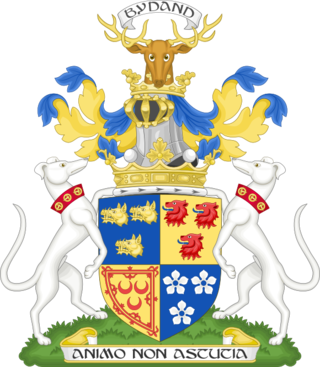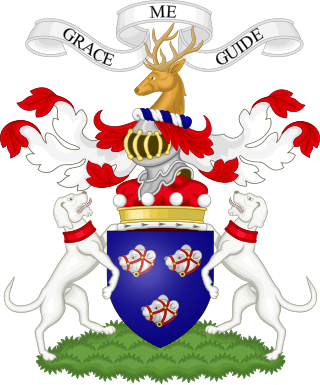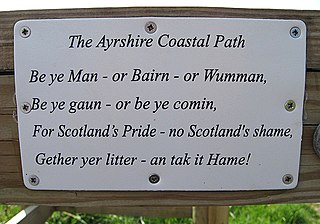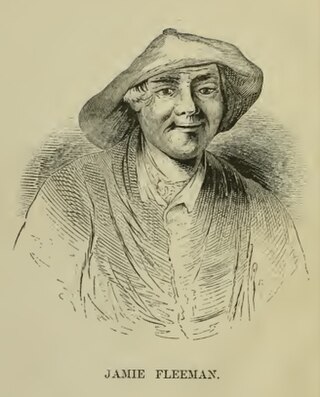
Marquess of Huntly is a title in the Peerage of Scotland that was created on 17 April 1599 for George Gordon, 6th Earl of Huntly. It is the oldest existing marquessate in Scotland, and the second-oldest in the British Isles; only the English marquessate of Winchester is older. The Marquess holds the following subsidiary titles: Lord Gordon of Strathaven and Glenlivet and Earl of Aboyne, and Baron Meldrum, of Morven in the County of Aberdeen.
There are currently two earldoms of Mar in the Peerage of Scotland, and the title has been created seven times. The first creation of the earldom is currently held by Margaret of Mar, 31st Countess of Mar, who is also clan chief of Clan Mar. The seventh creation is currently held by James Erskine, 14th Earl of Mar and 16th Earl of Kellie, who is also clan chief of Clan Erskine.

Sir Robert Aytoun or Ayton (1570–1638) was a Scottish poet.

Carolina Oliphant, Lady Nairne – also known as Carolina Baroness Nairn in the peerage of Scotland and Baroness Keith in that of the United Kingdom – was a Scottish songwriter. Many of her songs, such as, "Will ye no' come back again?", "Charlie is my Darling", "The Rowan Tree" and "Wi' a Hundred Pipers' remain popular today, almost two hundred years after they were written. One of her songs, "Caller Herrin'", was sung at the 2021 commemoration of the 1881 Eyemouth disaster. She usually set her words to traditional Scottish folk melodies, but sometimes contributed her own music.

Clan Gordon is a Highland Scottish clan, historically one of the most powerful Scottish clans. The Gordon lands once spanned a large territory across the Highlands. Presently, Gordon is seated at Aboyne Castle, Aberdeenshire. The Chief of the clan is the Earl of Huntly, later the Marquess of Huntly.
Gordon Duncan was a Scottish bagpiper, low whistle player and composer, born in Turriff, Aberdeenshire.
Bothy ballads are songs sung by farm labourers in the northeast region of Scotland.

Clan MacFarlane is a Highland Scottish clan. Descended from the medieval Earls of Lennox, the MacFarlanes occupied the land forming the western shore of Loch Lomond from Tarbet up-wards. From Loch Sloy, a small sheet of water near the foot of Ben Vorlich, they took their war cry of Loch Slòigh.
The personal name Duncan can be found in Scotland’s oldest records in its Gaelic form Dunchad/Donchadh/Donachie/Donnchadh and other spelling variants.

"The Bonnie Banks o' Loch Lomond", or "Loch Lomond" for short, is a Scottish song. The song prominently features Loch Lomond, the largest Scottish loch, located between the council areas of West Dunbartonshire, Stirling and Argyll and Bute. In Scots, "bonnie" means "attractive", "beloved", or "dear".
Johnie Cock is a traditional Scottish folk ballad, listed as the 114th Child Ballad and number 69 in the Roud Folk Song Index.

Clan Strachan is a Scottish clan originating from the barony of Strachan, in Aberdeenshire. The clan does not have a chief, therefore it is considered by Court of the Lord Lyon and the Stand Council of Scottish Chiefs as an Armigerous clan.

Clan Muir is a Scottish clan that is armigerous. Per certain sources, holders of the surname Muir, of Ayrshire, have been noted as a possible sept of Clan Boyd. A spelling variation More/Moore is a sept of Clan Leslie in Aberdeenshire, and, having genetic proof of Muirs in Aberdeenshire, may have roots in the Mure/Muir line of southwest Scotland.

Clan Forbes is a Highland Scottish clan from Aberdeenshire, Scotland.

Modern Scots comprises the varieties of Scots traditionally spoken in Lowland Scotland and parts of Ulster, from 1700.

Clan Cumming, also known as Clan Comyn, is a Scottish clan from the central Highlands that played a major role in the history of 13th-century Scotland and in the Wars of Scottish Independence. The Clan Comyn was once the most powerful family in 13th-century Scotland, until they were defeated in civil war by their rival to the Scottish throne, Robert the Bruce.

Jamie Fleeman or Fleeming (1713–1778) was better known as "the Laird of Udny's Fool" or "the Laird of Udny's Fule" in the Scots language. Although described as a fool, he had a reputation for his clever, witty repartee and many anecdotal tales of his actions are re-capped. He was specifically mentioned in the 1845 Statistical Accounts of Scotland and characterised in novels. Fleeman is associated with the Countess of Erroll and was used by her to carry messages to Jacobite rebels. He was probably the last family jester in Scotland.
Duncan Mearns (1779–1852) was a Scottish minister who served as Moderator of the General Assembly of the Church of Scotland in 1821. He was professor of divinity at Aberdeen University from 1816.
John Udny was a Scottish diplomat who served as British Consul at Venice and Leghorn.
Jock Duncan was a Scottish singer from Gelliebrae near New Deer in Aberdeenshire, known for singing many songs and bothy ballads from Aberdeenshire. He had performed at bothy ballad competitions since 1975 and made recordings of his music since 1996. In recognition of his work for furthering Scots singing, Duncan was inducted into the Scottish Traditional Music Hall of Fame in 2006. In 2000, Duncan was given a Herald Angel award from the Edinburgh Festival for his long work with ballad singing.












